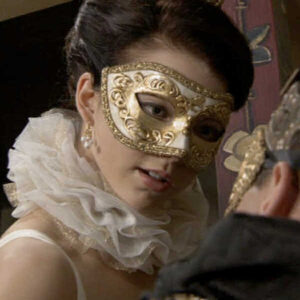 On the evening of Shrove Tuesday, 4th March 1522,* Anne Boleyn played the part of Perseverance at the pageant of “The Château Vert” at York Place, her first recorded public appearance at court since her return from France. Edward Hall records the pageant in his chronicle:
On the evening of Shrove Tuesday, 4th March 1522,* Anne Boleyn played the part of Perseverance at the pageant of “The Château Vert” at York Place, her first recorded public appearance at court since her return from France. Edward Hall records the pageant in his chronicle:
“On shrouetewesdaie at night, thesaid Cardinall to the kyng and ambassadors made another supper, and after supper thei came into a great chamber hanged with Arras, and there was a clothe of estate, and many braunches, and on euery braunche. xxxii. torchettes of waxe, and in the nether ende of thesame chamber was a castle, in which was a principall Tower, in which was a Cresset burning: and two other lesse Towers stode on euery side, warded
and embattailed, and on euery Tower was a banner, one banner was of iii. rent hartes, the other was a ladies hand gripyng a mans harte, the third banner was a ladies hand turnyng a mannes hart: this castle was kept with ladies of straunge names, the first Beautie, the second Honor, the third Perseueraunce, the fourth Kyndnes, the fifth Constance, the sixte Bountie, the seuenthe Mercie, and the eight Pitie: these eight ladies had Millian gounes of white sattin, euery Lady had her name embraudered with golde, on their heddes calles, and Millein bonettes of gold, with Iwelles. Vnder nethe the basse fortresse of the castle were other eight ladies, whose names were, Dangier, Disdain, Gelousie, Vnkyndenes, Scorne, Malebouche, Straungenes, these ladies were tired like to women of Inde.
Then entered eight Lordes in clothe of golde cappes and all, and great mantell clokes of blewe sattin, these lordes were named. Amorus, Noblenes, Youth, Attendance, Loyaltie, Pleasure, Gentlenes, and Libertie, the kyng was chief of this compaignie, this compainie was led by one all in crimosin sattin with burnyng flames of gold, called Ardent
Desire, whiche so moued the Ladies to geue ouer the Castle, but Scorne and Disdain saied they would holde the place, then Desire saied the ladies should be wonne and came and encoraged the knightes, then the lordes ranne to the castle, (at whiche tyme without was shot a greate peale of gunnes) and the ladies defended the castle with Rose water and Comfittes and the lordes threwe in Dates and Orenges, and other fruites made for pleasure but at the last the place was wonne, but Lady Scorne and her compaignie stubbernely defended them with boows and balles, till they were dnuen out of the place and fled. Then the lordes toke the ladies of honor as prisoners by the handes, and brought them doune, and daunced together verie pleasauntly, which much pleased the straungers, and when thei had
daunced their fill then all these disuisered themselfes and wer knowen: and then was there a costlv banket, and when all was done, the straungiers tooke their leaue of the king and the Cardinal and so departed into Flaunders, geuyng to the kyng muche commendacion.”
The King’s sister, Mary Tudor, Queen of France, played Beauty, the Countess of Devonshire played Honour, Jane Parker (later Boleyn) played Constancy, Mary Boleyn played Kindness and Anne Boleyn played Perseverance.
Wouldn’t you have loved to see this pageant?!
Although “The Tudors” series used this pageant as the event where Henry first laid eyes on Anne Boleyn, it is not known exactly when Henry noticed Anne at court and their relationship is usually dated to early 1526.
Tip: If you have trouble with the spelling in Hall’s account, just read it aloud.
It was also on this day that Henry VIII rode out at the Shrovetide joust with the motto “Elle mon Coeur a navera”, or “She has wounded my Heart”, and a picture of a wounded heart embroidered on the trappings of his horse. Although historians often connect this event to the start of Henry VIII’s relationship with Mary Boleyn, Anne Boleyn’s sister, there is no way of knowing who this motto was aimed at.
Source
*Eric Ives dates the Shrovetide celebrations as starting on 1st March 1522, hence my original dating of this event to 1st, but I’ve since found that the pageant actually took place on 4th March. Edward Hall has an entry for 3rd March and then his account of the pageant.
- Hall’s Chronicle, Edward Hall, p630-632 – This can be read online at http://www.archive.org/stream/hallschronicleco00halluoft#page/n5/mode/2up. Simply go to page 630 for Hall’s full description of the pageant.